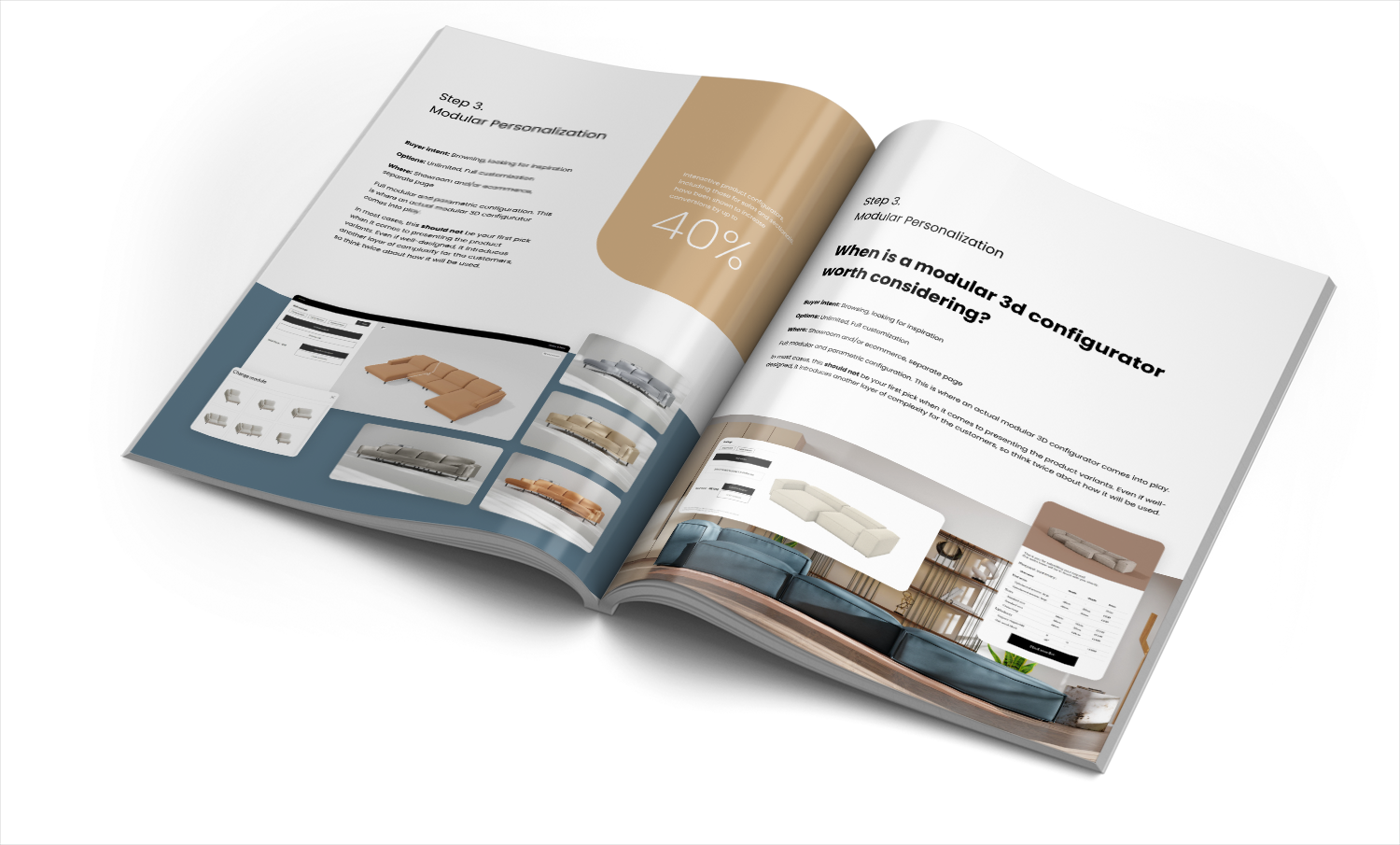The Ultimate 2025 Sofa Configuration Guide
Get your free copy todayy!

Sending showroom visitors home with only a list of product codes and vague options is a missed opportunity. If you’re still handing out basic A4 printouts, you’re not just undermining your customers’ experience—you’re leaving money on the table. Furniture manufacturers and retailers are increasingly asking: can I connect configurator outputs to CRM for lead tracking and sales automation? The short answer: not only can you, but it’s the factor that will turn your configurator from a flashy demo into your top sales engine. Here’s how and why.
Relying on sales reps to manually record configurations and leads has two consistent outcomes: errors and lost opportunities. Whether it’s mis-entered module codes, forgotten customer details, or quote delays, the result is the same—low conversion rates and mounting frustration for both reps and customers.
By connecting a 3D configurator to your CRM, every customer interaction becomes actionable data. Each saved configuration is automatically captured as a lead—complete with visuals, dimensions, price estimates, and even AR links for home visualization. Contact information, chosen options, and time spent interacting are all logged, ensuring follow-up is immediate and highly personalized. No more manual copying, no more missed leads.
This aligns closely with the approach discussed in how to turn configurator sessions into personalized follow-ups, where integrating configurator data with CRM enables automated, relevant customer engagement that boosts conversion.
Too often, even high-end furniture showrooms let customers leave with little more than a generic quote. There’s no contextual information, no images, and certainly no personalized digital touchpoint to bring customers back. This approach severely limits remarketing potential and makes it hard to distinguish between high- and low-value leads.
When you integrate CRM with your configurator, every visit becomes a marketing event. The CRM can automatically trigger tailored follow-up emails with “Here’s what you designed” content, send links for AR previews, and—crucially—keep your sales reps informed for proactive outreach. Customers are far more likely to return when they receive a professional, visual-rich summary of their session, linked directly to your sales process.
This concept is supported by insights from should I send the customer a PDF of their design after the session?, which highlights how detailed, personalized recaps improve buyer confidence and facilitate return visits.
Additionally, enhancing showroom professionalism through technology is explained in how showroom tech affects perceived professionalism, where an integrated configurator and CRM system elevates customer trust and marketing efficiency.
Many manufacturers rely on after-the-fact checks for order feasibility, sometimes dedicating staff just to validate if custom sofa modules actually fit together. This slows down the sales cycle, introduces the risk of quoting non-manufacturable products, and delays customer satisfaction.
A CRM-integrated configurator solves this by validating options in real time, ensuring only buildable products are quoted. The finalized configuration, along with a realistic PDF quote (with dimensions, lighting visualizations, and pricing), is directly sent to CRM for tracking and production. This reduces quoting time, minimizes errors, and facilitates data-driven decision-making.
This phenomenon is explored deeply in how does a configurator help reduce quoting errors?, where rule-based real-time validation eliminates manual mistakes and accelerates quoting cycles.
Moreover, the automation of bill of materials (BOM) integration discussed in what's a BOM and why does my configurator need to produce it? shows how syncing BOM data directly with CRM and ERP systems streamlines production readiness and cuts errors.
| Manual Workflow | Configurator-CRM Integration | |
|---|---|---|
| Lead Capture | Easily lost/misentered | Automatic, complete |
| Quoting Process | Slow, error-prone | Instant, visual, accurate |
| Follow-Up | Manual, often forgotten | Automated, personalized |
| Production Data | Separate, manual handoff | Synced with sales configuration |
| Marketing Impact | Minimal | Every session = campaign trigger |
If you’re not syncing configurator data with your CRM (and optionally your PIM, ERP, or marketing stack), you’re neglecting a wealth of insight:
This approach echoes the strategies in how to use configurator analytics to improve marketing campaigns, which leverages detailed user interaction data to refine targeting, increase conversion, and decrease wasted spend.
A major furniture manufacturer reduced manual order validation to zero and saw a double-digit increase in quote-to-sale conversion after integrating their 3D configurator with CRM—while reps gained hours back per week.
A 3D configurator that doesn’t talk to your CRM is little more than an interactive brochure. Fully integrated, it becomes the centerpiece of a high-performance sales and marketing engine—capturing more leads, converting more quotes, and enabling real personalization.
This emphasizes the importance of a complete, integrated solution as outlined in what's the ROI of a properly integrated configurator?, which demonstrates how combining configurator, CRM, ERP, and marketing tools drives measurable business growth.
Ready to see how CRM integration can level up your showroom and sales process? Book a free, 30-minute consultation with our experts to identify where your current setup is costing you—and how a connected configurator can start delivering measurable ROI in weeks, not months.